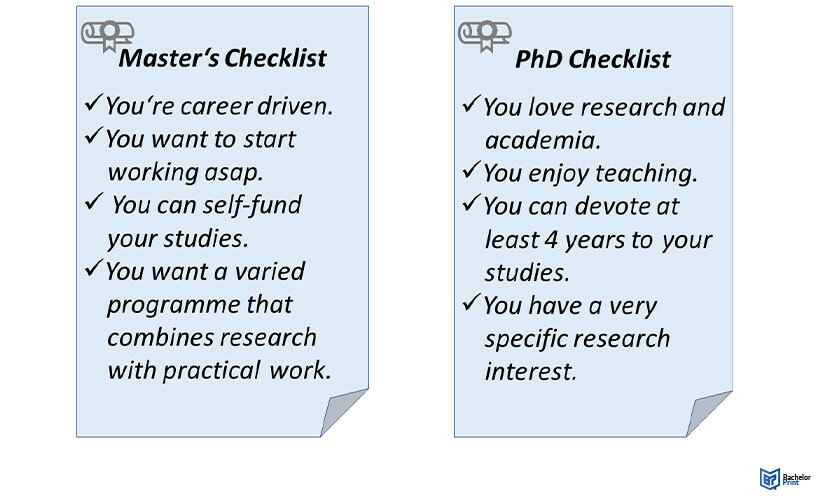
Deciding between pursuing a master’s degree or a PhD is a crucial step in one’s academic journey within graduate school. While both options offer advanced education and research opportunities, they differ in terms of scope, duration, and career outcomes. Deciding between a master’s and a PhD in graduate school? In this guide, we will explore the distinctions between master’s and PhD programmes, helping you make an informed decision about your academic path.
Definition: Master’s vs. PhD
A master’s degree combines taught elements with research. Coursework includes assignments, exams, and a research project or dissertation.
A PhD is research-based and focuses on a single topic. PhDs are awarded after submitting a written thesis and passing a viva (oral test).
- ✓ 3D live preview of your individual configuration
- ✓ Free express delivery for every single purchase
- ✓ Top-notch bindings with customised embossing

Master’s vs. PhD: Time requirements
Next, we look at the time requirements for master’s vs. PhD, so you can get a more accurate idea of what’s involved.
Master’s programme length
In the UK, full-time master’s degrees take 1 – 2 years, versus 1.5 – 2 years in the US.
In some countries (like Sweden), certain master’s take considerably longer: Up to 5 years for Computer engine drivering or 6 years for Medicine.
PhD programme length
In the UK, a full-time PhD takes 3 years. In most countries, the average duration is 3 – 4 years, except for the US and Canada, where it’s a minimum of 4 years.
Master’s vs. PhD: Career possibilities
This section explains how postgraduate studies can expand your career possibilities, comparing master’s vs. PhD.
Careers for master’s graduates
Master’s are career-focused degrees, so they can help you advance in your career and specialize in an area if you choose to.
A master’s can prepare you for a specific job or qualify you as a “generalist”.
Salaries for master’s graduates:
Below are the average salaries for Master’s graduates in the careers mentioned above.
Careers for PhD graduates
PhD graduates can work in academia, where they can teach at universities to give lectures, supervise master’s or PhD students, mark essays and exams, and publish original work.
You can move up the academic ladder and become a professor. This requires extensive teaching experience, having a large body of published research, participating in conferences, and being active in staff or department committees.
PhD graduates who don’t want to work in academia have other options.
Salaries for PhD graduates:
Below are the average salaries in USD and Pounds for master’s graduates in the careers mentioned above.
Master’s vs. PhD: Tuition fees
Tuition fees can be costly when choosing a master’s vs. PhD. The following section will help you make a decision between a master’s vs. PhD based on their cost.
Master’s tuition fees
Fees are typically higher in master’s vs. PhD. This is because there’s limited financial aid for master’s degrees since master’s students are usually self-funded.
- For a master’s in Management, typical tuition fees for public universities go from $30,000 to $120,000 / starting at £8,000 for British students and can go up to £30,000 for international students.
- Typical tuition fees for private universities in the US are similar to fees in public institutions. In the UK, they start at £22,000.
Some universities offer scholarship opportunities that cover tuition fees. The most well-known scholarships are:
- DAAD (Germany)
- Fullbright (USA)
- Mext (Japan)
- Gates Cambridge (UK)
PhD tuition fees
PhD tuition fees are typically waived. Students receive a small stipend that covers living expenses in exchange for working as instructors or research assistants.
Some universities also offer full or partial PhD scholarships. Sometimes, financial aid is also offered by government institutions, which award scholarships to outstanding students.
Master’s vs. PhD: Applications
Although the application procedure for master’s vs. PhD degrees is different, in most cases you’ll need to submit the following documents:
- Undergraduate diploma and transcript
- Motivation or presentation letter
- Your CV
- Letter/s of recommendation
Each university has different requirements for master’s vs. PhD applications. Always check with the department in question.
Master’s application
Master’s degree applications require evidence of previous undergraduate studies.
In the US, it’s also common to require a minimum GPA score of 3.0, plus additional tests like GMAT (for business and management Master’s) or LSAT (for law degrees).
In the UK, applications must include proof of an undergraduate degree with at least a 2:1 score, full academic transcripts, and proof of English language proficiency. GMAT and LSAT aren’t always required. You need to check with each university to see what applies.
PhD application
Since PhDs are research-oriented, the application must reflect your research interests and background, ensuring they match the expertise of a specific department.
The application must also include:
- A proposal where you descote the goals
- Framework
- Relevance of your research topic
In the UK, PhD applications don’t usually have a cost. Before applying, you should contact potential supervisors to ensure your research interests are a good fit. Deadlines usually close 1-3 months before the start date.
In the US, the research proposal doesn’t carry as much weight as it does in the UK. US universities consider other factors, such as personal and academic achievements and extra-curricular interests. There’s usually a cost associated with US applications, and they can be filed between August and December.
Master’s vs. PhD: Making the decision
Master’s vs. PhD – make the right decision with the help of this checklist.

FAQs
Not necessarily, but a PhDs entails a longer time commitment than a master’s.
Not always. Some universities let you apply to a PhD with a bachelor’s degree.
Many universities allow this, but it will take you twice as long to finish your degree.
In master’s degrees, there are different exams throughout the course. PhD students only take an oral exam at the end of their degree.
